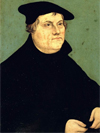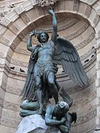|
Macedonianism
A 4th-century theological doctrine that denied the
divinity of the Holy Spirit, also known as the
Pneumatomachian heresy.
Named after
Macedonius I, bishop of Constantinople,
its adherents accepted the divinity of the Father and the Son but
maintained that the Holy Spirit was a created being and subordinate to
them. This view was condemned by the
First Council of Constantinople (381
AD), which affirmed the full divinity of the Holy Spirit and
incorporated this teaching into the
Nicene-Constantinopolitan Creed.
Macedonianism is considered one of the key heresies addressed in early
Trinitarian theology, alongside
Arianism.

Macedonius I
A fourth-century ecclesiastical
leader and Bishop of Constantinople, primarily remembered for his role
in the development of the
Pneumatomachian heresy.
Macedonius I was bishop of Constantinople from approximately 342 to 360
AD. He was associated with the
Arian controversy and became known
for teachings that denied the full divinity of the Holy Spirit,
asserting that the Spirit was a created being subordinate to the Father
and the Son. These views, propagated by his followers after his death,
gave rise to the
Pneumatomachian heresy.
The term Pneumatomachian derives from the Greek words pneuma (πνεῦμα),
meaning “spirit”, and machē (μάχη), meaning “fight” or “battle”, and
thus translates to “those who fight against the Spirit”. Macedonius was
twice deposed from his episcopal office and eventually exiled, dying
around 360 AD. His doctrine was later condemned by the
First Council of Constantinople (381
AD), which affirmed the full divinity of the Holy Spirit and
incorporated this teaching into the
Nicene-Constantinopolitan Creed.

Martin Lempereur
See
Merten de Keyser.

Martin Luther
A German theologian,
Catholic
monk, and seminal figure of the
Protestant
Reformation,
whose teachings fundamentally reshaped Western Christianity, Martin
Luther was closely connected with
Philip Melanchthon,
a fellow reformer, humanist scholar, and the first systematic theologian
of the
Reformation.
Born in Eisleben, Saxony, in the Holy Roman Empire, Luther initially
pursued a career in law before entering the Augustinian monastery in
1505, where he was ordained a priest and later became a professor of
theology at the University of Wittenberg.
Philip Melanchthon,
born Philipp Schwartzerdt in 1497, joined Wittenberg as a professor of
Greek at Luther’s invitation and became his closest collaborator,
systematizing Luther’s ideas and shaping Lutheran theology for both
clergy and laity. Luther’s theological convictions emerged from a deep
struggle with the concepts of sin and divine righteousness. In 1517,
Luther famously published his Ninety-Five Theses (Disputatio pro
Declaratione Virtutis Indulgentiarum), challenging the sale of
indulgences and the authority of the papacy. This act, symbolized by his
reputed posting of the theses on the door of the Castle Church (Schlosskirche)
in Wittenberg, ignited widespread debate and marked the beginning of the
Reformation.
Central to Luther’s theology was the doctrine of justification by faith
alone (Sola Fide), asserting that salvation is granted by God’s grace
through faith rather than by human works, a concept
Philip Melanchthon
systematized in his Loci Communes and the Augsburg Confession. Luther
also upheld the authority of Scripture alone (Sola Scriptura) as the
ultimate source of Christian truth, while Melanchthon complemented him
by emphasizing moral and intellectual instruction rooted in Scripture.
Luther translated the Bible into German, making it accessible to
laypeople and thereby shaping both religious practice and the German
language itself, and
Melanchthon
assisted in refining and teaching the translation.
Luther’s hymns, including Ein feste Burg ist unser Gott (A Mighty
Fortress Is Our God), helped establish congregational singing as a
central element of
Protestant
worship. Excommunicated by Pope Leo X in 1521 and declared an outlaw by
the Holy Roman Emperor Charles V, Luther found refuge under the
protection of Frederick the Wise at Wartburg Castle, where he continued
his translation and writing, while
Melanchthon
advanced
Reformation
education and theology at Wittenberg. Luther’s ideas spread rapidly
across Europe, giving rise to numerous
Protestant
movements and profoundly influencing theology, education, and politics.
His legacy endures in the Lutheran tradition and in broader
Protestantism,
which continues to uphold his central tenets of faith, grace, and
Scripture, a legacy solidified through
Melanchthon's
scholarship and systematic teaching. Martin Luther died on 18 February
1546 in Eisleben, the same town where he was born, leaving behind a
spiritual and intellectual revolution that transformed the course of
Christian history.


Merten de Keyser
The Flemish name of Martin
Lempereur, a 16th-century French printer and publisher, who worked
mainly in Antwerp (Flanders). He printed the first complete French and
English Bible translations, as well as a number of works by English
Protestant authors, including several works of William Tyndale. He is
also known by his Latinized name Martinus Caesar.

Michael (מִיכָאֵל)
Hebrew. “Who is like God”. Name of the first
archangel, who was known as a true servant of God. He was given the
highest rank and presides over all other angels. He is described as a
warrior and advocate for Israel, serving as one who stands for the
people of Israel in time of conflict and who intercedes for them before
God. He is considered a saint by the Roman Catholic and Eastern Orthodox
Church. In Islam, Michael is believed to be the archangel of mercy,
responsible for bringing rain and thunder to the Earth. Being the leader
of the celestial army in a battle with Satan, he is usually represented
in the dress of a warrior.

 |